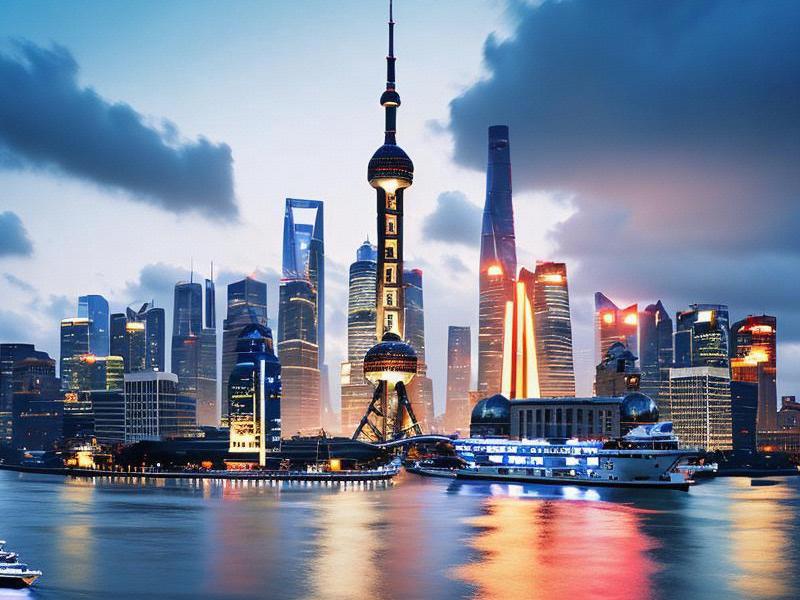
Shanghai, often referred to as the "Pearl of the Orient," stands as a testament to China's rapid urbanization and economic rise. This dynamic metropolis, located on the eastern coast of China, is not only the largest city in the country but also a significant player on the global stage. Over the past few decades, Shanghai has undergone a remarkable transformation, evolving from a traditional port city into a beacon of innovation, culture, and economic power.
Historical Legacy and Urban Development
Shanghai's history dates back to the Song Dynasty, when it was a small fishing village. However, its fortunes changed dramatically in the 19th century with the opening of treaty ports following the First Opium War. This period marked the beginning of Shanghai's rise as a major international port and a cosmopolitan city.
The Bund, a waterfront area along the Huangpu River, is a living museum of Shanghai's colonial past. Here, the juxtaposition of historic European-style buildings and the futuristic skyline of Pudong serves as a visual narrative of the city's transformation. Pudong, once a rural area, has been transformed into a symbol of Shanghai's modernity, housing the iconic Oriental Pearl Tower, the Jin Mao Tower, and the Shanghai Tower, the tallest building in China.
Shanghai's urban planning is a model of efficiency and sustainability. The city has invested heavily in public transportation, with its extensive metro system being one of the most efficient in the world. The Maglev train, connecting Pudong International Airport to the city center, is a marvel of modern engineering, offering a glimpse into the future of urban mobility.
Economic Powerhouse
爱上海同城对对碰交友论坛 Shanghai is the economic engine of China, contributing significantly to the country's GDP. It is home to the Shanghai Stock Exchange, one of the largest in the world, and a hub for international finance. The city's free trade zone has attracted numerous multinational corporations, making it a key player in global trade.
The development of Lujiazui, a financial district in Pudong, has further solidified Shanghai's position as a global financial center. This area is a melting pot of cultures, with skyscrapers housing offices of international banks, law firms, and consulting firms. The presence of the World Financial Center and the Shanghai Tower underscores the city's ambition to be a leading global financial hub.
In addition to finance, Shanghai is a hub for technology and innovation. The Zhangjiang Hi-Tech Park is a major center for research and development, attracting top talent from around the world. Companies like Huawei, Tencent, and Alibaba have established their research facilities in Shanghai, contributing to the city's reputation as a tech innovator.
Cultural Melting Pot
Shanghai's cultural scene is as vibrant and diverse as its economy. The city is a melting pot of Chinese and Western influences, reflected in its architecture, cuisine, and arts.
上海私人外卖工作室联系方式 The French Concession, with its tree-lined streets and charming cafes, offers a glimpse into the city's colonial past. Meanwhile, areas like Nanjing Road and Huaihai Road are bustling commercial districts, showcasing the latest trends in fashion, dining, and entertainment.
Shanghai's culinary scene is a testament to its cultural diversity. From traditional Shanghainese dishes like xiaolongbao (soup dumplings) and shengjianbao (pan-fried buns) to international cuisines, the city offers a feast for the senses. The Shanghai Food Festival, held annually, attracts food lovers from around the world.
The arts scene in Shanghai is thriving, with numerous museums, galleries, and theaters. The Shanghai Museum is renowned for its extensive collection of Chinese art, while the Power Station of Art is a contemporary art space showcasing works by both Chinese and international artists. The city's theaters host a variety of performances, from traditional Peking opera to modern musicals.
Global Influence
Shanghai's global influence extends beyond its economic and cultural contributions. It is a key player in international diplomacy, hosting numerous summits and forums. The Shanghai Cooperation Organization (SCO), a regional intergovernmental organization, has its headquarters in the city, highlighting its role in promoting regional security and cooperation.
上海喝茶服务vx The city's commitment to sustainability and green development is also noteworthy. Shanghai has set ambitious targets for reducing carbon emissions and increasing the use of renewable energy. Initiatives like the construction of the world's first commercial-scale carbon capture plant demonstrate the city's leadership in addressing climate change.
Challenges and Future Prospects
Despite its many achievements, Shanghai faces several challenges. Rapid urbanization has led to issues such as traffic congestion, housing shortages, and environmental concerns. The city government has implemented various measures to address these issues, including the expansion of public transportation, the promotion of green buildings, and the development of satellite cities.
Looking ahead, Shanghai's future prospects are bright. The city is poised to become a global leader in innovation and sustainability. Its strategic location, robust infrastructure, and talented workforce make it an attractive destination for businesses and investors.
Shanghai's transformation from a traditional port city to a global hub of innovation and culture is a story of resilience and ambition. As the city continues to evolve, it remains a symbol of China's rise on the world stage. With its unique blend of historical charm and modernity, Shanghai is not just a city; it is a living testament to the possibilities of urban development and global connectivity.
